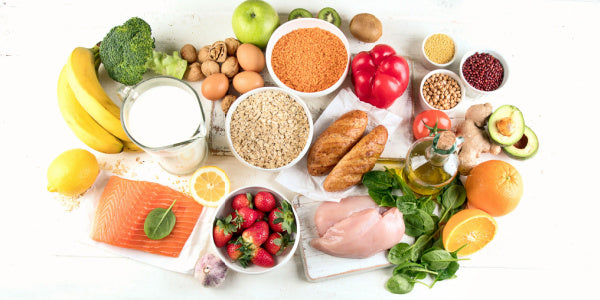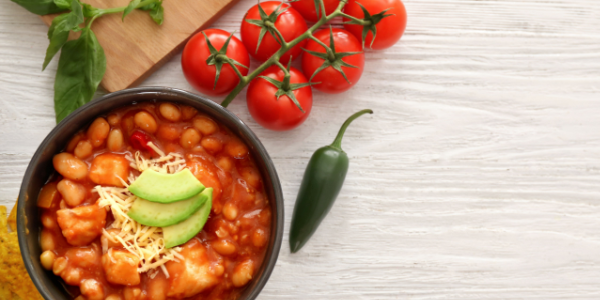
In theory, cutting out entire food groups for weight loss can help cut out calories, ultimately leading to weight loss. And though the practice of cutting out food groups certainly could shed off unwanted pounds, it isn’t the healthiest way to lose weight.
So, if cutting food groups are not the best way to lose weight, what foods should you cut to lose weight?
Dive into lean what the food groups are, why they are important, and what dietitians really recommend to cut out for weight loss.
What Are the Main Food Groups?
According to the United States Department of Agriculture's Choose My Plate, all the main food groups should be included in your diet. My Plate further suggests how many servings of each food group you should eat per day based on sex, age, and activity level.
Each meal should be composed of foods (or drinks) representing all the food groups because they all provide unique health benefits. At meals, half the plate should be filled with fruits and vegetables. A quarter of the pate should be filled with both grains and protein with a serving of dairy also on the side.
Grains
Grains are exceptionally valuable for their fiber and B vitamin content. Without each, digestive health and efficient energy use may be compromised.
Choose whole grains like whole-wheat bread, brown rice, oats, quinoa, etc. over-processed grains as much as possible for the greatest health benefits.
Fruits
Like grains, fruits also contain high amounts of fiber. The vibrancy and color of fruits offer powerful antioxidants that protect the body against damage.
While 100 percent fruit juice can count as a fruit serving, the emphasis should be on eating mainly whole fruits.
Vegetables
Veggies are especially a "yes!" when answering the question, "Is cutting out carbs bad for you?" Also along with grains and fruits, veggies are considered a carbohydrate source and supply the body with fiber, antioxidants, vitamins, and minerals.
Eat a variety of different colored vegetables to get the most benefits vegetables have to offer.
Protein
Proteins is a flexible word, especially in the context of animal meats and plant-based sources. But despite the source, choosing lean proteins offers the body sustained or growing muscle mass to keep the body strong.
Such protein products further play a role in skin formation and wound healing. As with vegetables, it is important to eat a variety of proteins.
Dairy
Milk and dairy products are valuable as they are generally a well-rounded food group, offering carbohydrates, protein, and sometimes fat. However, it is important to divvy away from dairy products that contain added sugars.
When naturally or minimally processed, well-balanced macronutrients and the high calcium and vitamin D content (when fortified) make dairy products exceptionally beneficial.
For those that are lactose intolerant, consume non-dairy substitutes that have been fortified with calcium, vitamin D, and vitamin B12 for those following a vegan diet.
Why You Should Not Cut Food Groups for Weight Loss
Cutting out all foods in a food group for weight loss means unnecessarily limiting fiber, vitamins, minerals, and antioxidants that all provide important health benefits. So, while you may be cutting out calories, you are cutting out other important nutrients.
Instead of cutting out all foods in a food group, pick the healthiest options in each group. Aim to eat a variety of food choices instead of limiting intake to a small number of foods.
If you want to eat less of a certain food group, consult with your doctor or a dietitian to go over any personalized health goals and eating plans. Cutting back on some foods may be warranted to food allergies or certain health conditions. However, cutting out foods for weight loss is not recommended.
In Conclusion: Foods You Should Cut For Weight Loss
For weight loss and to maximize health, focus on reducing the intake of processed, refined products like white bread, white pasta, etc. Increasing the intake of nutritious foods will naturally eliminate a spot in the diet for foods that essentially offer nothing more than calories - think pastries, chips, fast food, ice cream, cookies, sodas, etc.
Instead of focusing on eliminating all foods in one (or more) food group, focus on cutting back on foods that are highly processed and are a far cry from raw, whole foods.
While processed foods should be the focus for cutting out for weight loss, it does not mean you can never eat these foods. Depriving yourself of what you truly desire or want can create binges or overeating of such foods later down the road and lead to an unhealthy relationship with food.
And as an end statement, remember weight does not always dictate health! Supply the body with nutrient-rich foods to keep it driving down a healthy journey called life!







